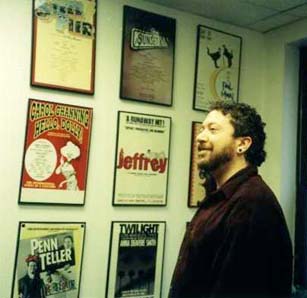
|
Carolee Carmello as Marguerite SP3: Neil Simon Theater |



NR: During the ball scene, the Prince of Wales is conducting. Is he following you or are you following him, and is that tough?
RM: In version 1, because David Cromwell is a conductor, I actually said, "You lead it and I'll follow you." In version 2, that's just leftover like your appendix, it does nothing. He's up on the balcony. He's conducting his heart out. Nobody's looking at him. It's just local color. In the first version he was conducting.
NR: This is a pet peeve within the League. Everyone wants to know if you consider Douglas Sills to be a singer.
RM: Yes, I do. He sounds good enough, and he's neurotic enough. So, I think he does qualify as a singer. I think he's smart to say, "I don't think of myself as a singer." He sings well, like he fences well, and you would hire him for singing like you would hire him for stage combat. But his strength is his acting, and I think it's always better to say, "This is what I do" and have people be pleasantly surprised at how well you do the other things.
NR: Is there any chance of a new cast album, or have we lost that? (Note: This interview took place before Douglas announced he was staying past March 7th.)
RM: No, I don't think you've lost it. Pimpernel loves doing things that have never been done before, so I think we might be talking about some sort of a hybrid album where we would go in and record some key new tracks like "I'll Forget You" and the new "Storybook," and perhaps Rex's performances of the two Chauvelin songs. And we might put together an album with some cuts from the first cast album, these cuts and maybe a bonus track or two of Linda Eder and Peabo.
NR: How about the last note of "Prayer?"
RM: The economics...you know, if you brought Douglas Sills back in to sing one note, you would have to pay him enough to make the album not possible. What I was thinking of doing is trying to sell just a strip of cassette tape with the last note on it. Then people could paste that into their cassette players.
NR: (laughing) And we would probably buy it! (seriously) Do you feel the League has had an impact on the show?
RM: Yeah, I actually do. When I worked on Jekyll & Hyde, and I'm coming at this from a 25 year background on Broadway, I just thought it was goofy that there were these people that thought they really had an impact on what was going on. In Pimpernel, we spent the first year going week to week, thinking we were going to close any minute. And sometimes it was your confidence in us and your confidence in the show that would sort of keep us going. We were very demoralized from time to time, and just knowing that there were some people out there that really wanted the thing to work, and especially those nights when many of you showed up and we would just feel that warmth, I think it made a huge difference. I don't think the producers would have been as willing to keep going during some of the times when it was looking pretty bleak on the numbers if they didn't walk in there and hear what they heard. I remember hearing from one of the original four producers, "I don't understand this because we're losing money, but I go out there and they love it. We've got to figure out a way."
NR: What kind of music do you listen to?
RM: None. I think it's just an occupational hazard. After I've spent an entire work week working with music, silence on my stereo is a glorious sound. I have a synthesizer at home that makes random ocean wave sounds, and I wish there was Broadway on the beach because I would move there in a second. There's either silence in my house or ocean.
NR: What other musical projects are you involved in?
RM: I came to town to write, and I still think of myself as a composer with the best possible day job. I love being the musical director of Pimpernel. But what I'm here to do, and what I continue to hope to do is write. I've had a hard time getting anybody to care other than in church music. I've been able to get some stuff published and some stuff recorded in the church. But in terms of theatrical projects and things like that, not until this year. I'm happy now that I have an album out. The singer is Judy Malloy and the album is called The Missing Peace. That's available. It's for sale through Amazon on the web. It's a 24 song, one woman song-cycle journey, which had its genesis in church music.
NR: What do you wish you had more time for in your life?
RM: Reading... reading books.
NR: What would you like to do in the future?
RM: Go right back to the composing question. I'd love to do exactly what I do, which is tell stories that have music and theater and dance in them. But I would like to be the one to generate the stories rather than helping somebody else to tell his or her story. I really feel like I'm full of stories and I'd love to have the chance to tell them.
Ron is very soft spoken, but you can tell how excited he is about the stories he would like to tell. I hope he is given the chance to create his own original work for the Broadway stage.
Questions suggested by:
Nicole Albertson, Lois and Elizabeth Colpo, Joanna Morton-Gary, Thom and Colleen Rosati, Stephanie Henkin, Renee, Peter Williams
Website Copyright Policy